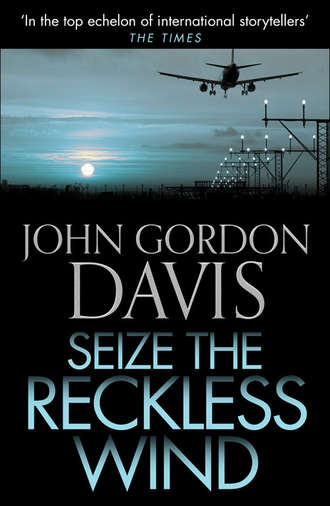
Полная версия
Seize the Reckless Wind

JOHN GORDON DAVIS
Seize the Reckless Wind

COPYRIGHT
HarperCollinsPublishers
1 London Bridge Street
London SE1 9GF
www.harpercollins.co.uk
First published in Great Britain by HarperCollinsPublishers 1984
Copyright © John Gordon Davis 1984
Cover photograph © Shutterstock.com
John Gordon Davis asserts the moral right to be identified as the author of this work
A catalogue record for this book is available from the British Library
This novel is entirely a work of fiction.
The names, characters and incidents portrayed in it are the work of the author’s imagination. Any resemblance to actual persons, living or dead, events or localities is entirely coincidental.
All rights reserved under International and Pan-American Copyright Conventions. By payment of the required fees, you have been granted the nonexclusive, nontransferable right to access and read the text of this e-book on-screen. No part of this text may be reproduced, transmitted, downloaded, decompiled, reverse-engineered, or stored in or introduced into any information storage and retrieval system, in any form or by any means, whether electronic or mechanical, now known or hereafter invented, without the express written permission of HarperCollins e-books.
HarperCollinsPublishers has made every reasonable effort to ensure that any picture content and written content in this ebook has been included or removed in accordance with the contractual and technological constraints in operation at the time of publication.
Source ISBN: 9780007574414
Ebook Edition © SEPTEMBER 2014 ISBN: 9780008119300
Version: 2014-12-19
DEDICATION
FOR ROSEMARY
I am deeply indebted to Malcolm Wren of Wren Airships Ltd. and his staff for all their patient instruction in the science of airships, and to Kevin McPhillips, Harry Green, Lynn Wilson and Michael Owen for taking me literally under their wing and allowing me to learn at first hand about the air frieght business.
All the characters in this novel are, however, fictitious.
CONTENTS
COVER
TITLE PAGE
COPYRIGHT
DEDICATION
PART 1
CHAPTER 1
CHAPTER 2
CHAPTER 3
CHAPTER 4
PART 2
CHAPTER 5
CHAPTER 6
CHAPTER 7
CHAPTER 8
CHAPTER 9
PART 3
CHAPTER 10
CHAPTER 11
CHAPTER 12
CHAPTER 13
CHAPTER 14
CHAPTER 15
CHAPTER 16
CHAPTER 17
CHAPTER 18
PART 4
CHAPTER 19
CHAPTER 20
CHAPTER 21
CHAPTER 22
CHAPTER 23
CHAPTER 24
PART 5
CHAPTER 25
CHAPTER 26
CHAPTER 27
CHAPTER 28
CHAPTER 29
CHAPTER 30
CHAPTER 31
CHAPTER 32
CHAPTER 33
CHAPTER 34
CHAPTER 35
CHAPTER 36
CHAPTER 37
PART 6
CHAPTER 38
CHAPTER 39
CHAPTER 40
CHAPTER 41
CHAPTER 42
PART 7
CHAPTER 43
CHAPTER 44
CHAPTER 45
CHAPTER 46
CHAPTER 47
CHAPTER 48
PART 8
CHAPTER 49
CHAPTER 50
CHAPTER 51
CHAPTER 52
CHAPTER 53
CHAPTER 54
CHAPTER 55
CHAPTER 56
CHAPTER 57
PART 9
CHAPTER 58
CHAPTER 59
CHAPTER 60
CHAPTER 61
CHAPTER 62
CHAPTER 63
CHAPTER 64
PART 10
CHAPTER 65
CHAPTER 66
CHAPTER 67
CHAPTER 68
CHAPTER 69
CHAPTER 70
CHAPTER 71
CHAPTER 72
CHAPTER 73
PART 11
CHAPTER 74
CHAPTER 75
CHAPTER 76
CHAPTER 77
KEEP READING
ABOUT THE AUTHOR
ALSO BY THE AUTHOR
ABOUT THE PUBLISHER
PARIS 1897
It was a beautiful morning. The Eiffel Tower rose up into a cloudless sky. Crowds thronged the Champs-Elysées and the cafés, bonnets and parasols and top hats everywhere, and carriages were busy. A parade marched towards the Arc de Triomphe, the people cheering and flags waving. Then there was a new sound above the applause, and a blob came looming over the treetops, spluttering. It was a man flying a tricycle.
His name was Alberto Santos-Dumont. It was one of those newly-invented De Deon motor-tricycles; but the steering was connected to a canvas frame behind, like a ship’s rudder, and the engine turned a wooden propeller. Above this contraption floated a big egg-shaped silk balloon of hydrogen, from which the tricycle with the incumbent Alberto were suspended.
Alberto sailed low over the crowds, and all faces were upturned, delighted and waving. The air-cycle went buzzing and backfiring round the Arc de Triomphe, then it headed over the rooftops towards the Eiffel Tower. It rose higher and higher, then sailed ponderously round the mighty tower to roars of applause.
Whereupon Alberto wanted a drink. He came looming down towards the boulevards, spluttering between the treetops, making horses shy. Ahead was his favourite café. Alberto brought his flying machine down lower, and steered it towards a lamppost. He threw down a coil of rope, and his friends grabbed it and tied it to the lamppost. Alberto’s engine backfired, and died. The balloon-cycle was moored, hitched above the cobblestones like an elephant.
Alberto jumped down, and walked jauntily into the café, smiling and shaking hands.
ENGLAND 1929
Those were the days of glory and empires, when the statesmen of Europe carved up the world, planted their flags and brought law and order, and Christianity, to the heathen. Everything was well ordered, and if you looked at an atlas much of it was coloured red, for Great Britain, not red for communist as it would be coloured today. The world was full of adventure; and the vast wild places teemed with animals, the seas were full of fish and whales. This was only yesterday, only in your father’s day, and maybe in your own. The world was beautiful, and there were no oilslicks on the seas, no oil fumes hanging in the air, no pollution blowing across oceans to make acid rain in faraway places. In those days there were some dashing young men in flying machines, but it was before the age of air travel.
In a field outside the town of Bedford stood two great hangars. Inside one of them, hundreds of men were building a great airship, as long as two football pitches put end to end, great frames of aluminium covered in canvas, and its huge gasbags were made of ox-intestine, to be filled with hydrogen. The ship was being built by the government and it was called the R 101. Across country, in Yorkshire, another airship was being built by a private company for the government, and it was called the R 100. The R 100 was finished first, and she flew on her trials to Canada and back, to much acclaim. There was great urgency to finish the R 101 so she could carry the Secretary of State to India and back in time for the Empire’s Jubilee. But when the R 101 was tested, she was sluggish. So they cut her in half and added a whole new section to hold another huge gasbag. But there was not time for all her trials before she left.
It was a cold, rainy afternoon when the R 101 took off for India, with her famous personages aboard. She flew over London, and down in the streets people were waving madly. It was dark when she flew over the Channel, and the rain beat down on her. As she flew over the coastline of France the captain reported by radio to London that his famous passengers had dined well and retired to bed.
That was the last communication.
It is not known for certain why it happened but near Beauvais the great ship came seething down to earth out of the darkness. There was a shocking boom and the great frame crumpled and a vast balloon of flame mushroomed up, and then another and another, and the huge mass of buckled frames glowed red in the ghastly inferno.
There were only six survivors. The world was horrified. And, after the Commission of Inquiry, the other airship was dismantled in her hangar, and broken up with a steam-roller, and sold for scrap.
NEW JERSEY, AMERICA: 7 MAY 1937
In the late afternoon the monster appeared.
It came from the Atlantic, looming slowly larger and closer towards the skyscrapers of New York. It had huge swastikas emblazoned on its tail. It was over seven hundred feet long, a leviathan filled with seven million cubic feet of hydrogen. The sun shone silver on her mighty body, and down in the concrete canyons the people stared upwards, awed, and the passengers gazed down on beautiful Manhattan, the Hudson with steamships from all around the world, the Statue of Liberty, Long Island fading into distant mauve, America stretching away in the lowering sun: Her sister ship, the Graf Zeppelin, had made one hundred and thirty trans-Atlantic flights in the last nine years, but people never tired of seeing such massive beauty sailing so majestically through the sky. She was called the Hindenburg, and she was the newest prize of the German airfleet. She could carry seventy passengers, sleeping in real cabins and dining in a saloon at real tables with real cutlery, strolling along promenade decks, looking down on to the countrysides gliding quietly by below, so close they could even hear a dog bark and a train whistle.
There was a big crowd awaiting her at the Lakehurst airfield in New Jersey; the ground crew, people to meet the passengers, pressmen, sightseers. The sun was setting when she came into sight. She came through the darkening sky, slowly becoming larger and larger, the captain slowly bringing her down, and the crowd broke into a mass of waving.
The mooring mast was a high steel structure. The ship came purring across the airfield towards it, headed into the breeze, a wondrous silver monster easing down out of the sky; a rope came uncoiling out of her nose; the ground crew ran for it. There was the sound of an explosion; for an instant there was a hellish blue glow, then a great flame leapt upwards.
It exploded out of the stern, and in a moment most of the airship was engulfed in barrelling fire. Instantly half the canvas was gone and the frame glared naked in the sky; the flame mushroomed enormously upwards, yellow and black, and the stern began to fall. There was a second explosion and more flame shot up, the great ship shook. All the passengers knew was the terror, and the deck suddenly lurching away beneath them, and the terrible glare, and the heat. Now the flaming ship was falling to earth in a terrible slow-motion, stern first. There was a third explosion and the airship hit the ground, a blazing mass of frames and flames. The crowd was screaming, people were running to try to help and the radio commentator was weeping, ‘Oh my God … It’s terrible … I can’t watch it … All those people dying … Oh my God this is terrible …’
Some people leapt out before it hit the earth, some managed to fight their way out as it crashed. They came staggering out, reeling, on fire, twisting and beating themselves, roasting and crazed. The night was filled with flame and weeping and shouting.
CHAPTER 1
It is always hot in the Zambesi Valley. From the hard escarpments the valley rolls away, descending through many hills, stretching on and on, mauve, fading into haze, like an ocean, so vast you cannot see the escarpments on the other side. It is a wonderful, wild valley, with elephant and lion and all the buck, and the river is hundreds of yards wide, with sandy banks and islands, and hippo, vundu fish as big as a man, big striped fighting tiger fish, and many crocodiles. The mighty river flows for thousands of miles, from the vast bushland of Angola in the west, over the Victoria Falls – the Smoke that Thunders – through Rhodesia, and Mozambique, and out into the Indian Ocean in the east. The river flows through many narrow rock gorges on this long journey, and where it twists and roars through the one called Kariba it is the home of Nyamayimini, the river god. It was at the entrance to this god’s den that the white man built a mighty wall across the river, to flood a huge valley to the west and create an inland sea.
For those were the days of the ‘winds of change’ that swept through Kenya to the rest of Africa, and the big brave days of Federation and Partnership between white go-ahead Rhodesia, black copper-rich Zambia and poor little Malawi; partnership between the races, equal rights for all civilized men, big white brother going to help little black brother, economic and political partnership, white hand clasped with black hand across the Zambesi. And the white man built the wall across the mighty river to create electricity for the industries that were going to boom, and the inland sea was a symbol of this new partnership. There were the political ones, black men in city clothes who came to the valley and told the Batonka people that the story of the flood was a white man’s trick to steal their land, and that they must make war; but the wall slowly went up and the great valley slowly, slowly drowned and died. And with it a whole world of primitive wonder. It was heartbreakingly sad. One day all of Africa would die like that, under the rising tides of the winds of change.
And very soon the partnership died as well, because by the nature of things it was a partnership between the white rider and the black horse, and because the winds of change moaned that there must be One Man One Vote and that the rider must be black. And the political ones, who had been to Moscow and Peking, swaggered through the bush calling the people to meetings, telling them that they must join the Party and take action. Action, boys, action! Burn the schools and burn the missions, burn the diptanks in which the government makes you dip your cattle, stone the policemen and stone the people who are going to work in the factories, burn the huts of the people who do not take Action, maim their cattle and beat their wives and children – and when we rule the country every man will have a white man’s house and a bicycle and a transistor radio. And great mother Britain had lost her will; she dissolved the partnership and gave independence to black Zambia and black Malawi because it was easier and cheaper to give away countries than to govern. But she refused independence to white Rhodesia, because that too was easier than to shout again st the winds. And the white men in Rhodesia were angry, for they had governed themselves for forty years and they feared that if they were not independent Great Britain would give them away too, and so they declared themselves independent, as the American colonies had done two hundred years before. Thus the white men made themselves outlaws, and the winds of change howled for their blood, and began to make war.
In the third year of that Rhodesian war, when a new election was coming up, Lieutenant Joe Mahoney, who was a lawyer when he was not soldiering, almost won a medal for valour, but do not be too impressed by that because it happened like this:
The truck carrying his troopers was trundling along the escarpment of the Zambesi valley when suddenly there was a burst of gunfire, the truck lurched and Mahoney, who was standing at that moment, fell off the back. He landed with a crash on the dirt road, but still clutching his rifle. For a bone-jarred moment all he knew was the shocked terror of being left in a hail of gunfire; then he collected his wits, scrambled up and fled. He fled doubled-up across the road, and leapt into the bush, desperately looking for cover, when suddenly he saw terrible terrorists leaping up in front of him.
Leaping up and running away, terrorists to left of him, terrorists to right of him, all running for their lives instead of blowing the living shit out of him. For Mahoney, in his shock, had run into their gunfire instead of away from it; all the terrorists saw was the angriest white man in the world charging at them with murder in his heart, and all Mahoney knew was the absolute terror of running straight into the enemy and the desperate necessity of killing them before they killed him, and he wildly opened fire. Firing blindly from the hip, sweeping the bush with his shattering gun, the desperate instinct to kill kill kill the bastards before they kill me, and all he saw was men lurching and crashing in full flight – he went crashing on through the bush after them, God knows why, gasping, Joe Mahoney single-handedly taking on the fleeing buttocks of the Liberation Army – he ran and ran, rasping, stumbling, and through the trees he saw a man, fired and saw the blood splat as the man contorted; then Mahoney threw himself behind a tree and slithered to the ground, on to his gasping belly; then his own boys were coming running through the trees; and he sank his head, heart pounding, sick in his guts.
He had just killed seven men all by himself, and he was a hero. Maybe the whole thing had taken one minute.
For the next two days they tracked the rest of the terrorists. The tracker walked ahead, flanked by two men to watch for the enemy while his eyes were on the ground; the troopers followed behind, eyes constantly darting over the bush, every muscle tensed for the sudden shattering gunfire, ready to fling themselves flat. For two days it was like that, stalking through the endless bush under the merciless sun, slogging, sweating, and all the time every nerve tensed to kill and die – and oh God, God, Mahoney hated the war, and hated himself.
Because Joe Mahoney, QC, Africa-lover, African lover, just wanted to kill kill kill and get it over, with all his stretched-tight nerves he longed for contact, so that he could go charging in there and get it over with … But for what?
Because the enemy were murderous bastards who brutalized their own tribesmen, burned their huts and crops and schools and maimed their cattle, terrorizing everybody into submission because that is the only law Africa respects? Because they were smash-and-grab communists, their heads stuffed with the nihilism of Moscow and Peking who are dedicated to the destruction of the West, to the wars they were waging and winning in the rest of Africa and Central America and Asia and the Middle East, winning by default because the West was now so pusillanimous and gutless? Ah yes, when he reminded himself of these matters Joe Mahoney did not feel so bad. ‘What are you fighting for, lad?’ he sometimes asked round the fire at night, when the theory is you should be a father-figure to your men, though he really asked it because he wanted to ease his conscience.
‘For my country, sir.’
‘Against the communists, sir.’
‘Anything else?’
(And, God knows, was that not enough?) There always ensued a rag-bag discussion in which half-digested evidence steamrollered itself into gospel truth, tales of barbarity mixed with contempt. How the fucking hell can they rule the fucking country, sir? Usually Mahoney just listened like the magistrate he used to be when large tracts of the world were still governed by the impeccable Victorian standards of the old school tie, a good grasp of Latin verbs and the ability to bowl a good cricket ball. Sometimes he interrupted them with something like: ‘Gentlemen, I know we’re all in the bush getting our arses shot off without the comfort and society of our womenfolk, but do you think we can uphold some of these standards we cherish by not making every adjective a four-letter word?’
But usually he just sat there and listened, his dulled heart aching, for Africa. Because Africa was dying, bleeding to death from self-inflicted wounds. And his heart ached for his troopers too, because Africa was all they had and they were going to lose it, and they did not realise that it was really a black man’s war they were fighting and dying for. ‘For my country, sir, because how the hell can they run the country, sir?’ Oh, it was true. But they thought they were fighting a white man’s war, for the white man’s status quo. And, if so, was it a just war? Had the white man given the black man his fair share of the sun? And, if not, could this war be won? To win, must not the army be the fish swimming in the waters of the people? Was not the real battle for hearts and minds?
The next afternoon the spoor led to a kraal of five huts. The troopers silently surrounded the kraal, while the tracker did a big three-sixty through the surrounding bush, looking for the terrorists’ spoor leading out. After fifteen minutes he found it.
‘How old?’
‘A few hours,’ the tracker said. ‘They left about noon.’
Mahoney turned and ran back to the kraal, while his men kept him covered. ‘Where is the headman?’ he shouted.
The African woman looked up, astonished. An infant with flies round his nostrils stared, then burst into tears. People came creeping out of the huts, wide-eyed, young and old, in white man’s tatters. ‘Are you the headman, old gentleman?’ Mahoney demanded.
The man was grey-haired. ‘Yes, Nkosi.’
‘Some terrorists have been to your kraal today. How many?’
The old man was trembling. ‘I have seen nobody, Nkosi.’ Everybody was staring, frightened.
Mahoney took him by the elbow and led him aside.
‘Their spoor leads into your kraal. Where were they going?’
The old man was shaking. ‘They did not say, Nkosi.’
‘What did they want from you?’
The old man trembled. ‘They ordered my wives to cook food.’
‘How many men?’
‘I think there were ten.’
Mahoney took a big, sweating breath. ‘If anymore come, you have not seen me. When I leave now, you will obliterate my spoor in your kraal. Understand?’
Mahoney turned and left. The soldiers started following the spoor again, hard.
When darkness fell they were less than two hours behind the terrorists. With the first light they started again.
After an hour the spoor split into two groups.
‘They’re looking for more kraals. For more food.’
Mahoney divided his men. After an hour the spoor he was following turned. It headed back towards the old man’s kraal.
When the terrorists got back to the kraal they ordered the women to cook more food and they sat down to wait.
‘Have you seen any soldiers?’









